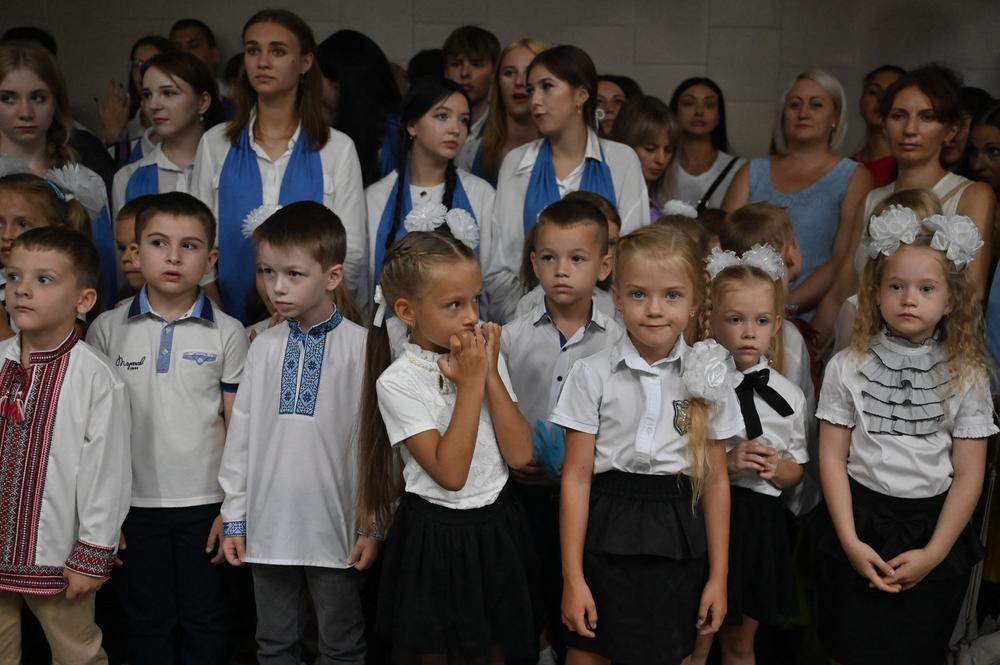As Russia's war drags on, it's not only territory and soldiers that Ukraine is losing — a whole generation of young people is gradually disappearing.
The school year in Ukraine this year once again began under the threat of Russian mass missile and drone attacks, a now annual reminder of the pressures facing youngsters in the country, and the ever present choice facing many — stay in Ukraine, or leave for a safer country.
"Some young people continue to leave, some will never return. This is a worrying trend," Ukraine’s Education Ombudsman Nadiya Leshchyk, told the Kyiv Independent.
There is no complete tracking system for students who leave. Many remain formally enrolled in Ukrainian schools but continue their education remotely from abroad. Still, officials observe that schools often end the school year with significantly fewer students than when they started.
This is part of a much deeper demographic shift. According to Leshchyk, recent data show Ukraine’s youth population has dropped sharply — from nearly 9 million in early 2022 to around 6 million by 2024. If the trend continues, the Institute of Demography warns, it could drop below 5 million by 2030.
"In 2023, 66% of young Ukrainians abroad said they wanted to return home," Leshchyk says citing the report “Impact of War on Youth in Ukraine” by the research agency Info Sapiens.
"In 2024, that figure dropped to 32%. Young people are adapting abroad more quickly than older generations."
The safety of abroad
The war remains by far the most pressing reason why young Ukrainians are leaving the country. Safety concerns, forced displacement, and legal restrictions, especially for male students, all play a role. For many, planning a future in Ukraine has become too uncertain.
"We are seeing a general trend that concerns migration overall, and it is directly linked to the war. The first issue, of course, is security," says Minister of Education and Science Oksen Lisovyi at the Education of the New Ukraine conference in May 2025.
For teenage boys, the pressure is even greater. While military service officially begins at 25, men are banned from leaving Ukraine when they turn 18. Fearing future conscription or new restrictions, many parents act early, sending their sons abroad before adulthood.
Ruslan Hourani, a 19-year-old now living in Poland, left Ukraine two years ago at his parents’ initiative.
"They didn’t want me to become stuck," he says. "They found an agency that helped with the paperwork and sent me to study abroad."
Ruslan admits he hasn’t settled in Poland and hopes to return "once the fighting eases."
On Aug. 28, a new law came into force allowing men aged between 18 and 22 to freely leave Ukraine. Experts believe the policy could help those already abroad maintain ties — visiting home and remaining part of society.
"I want to come back under the new law, but I’m afraid I’ll lose my ability to leave again. I want to see how it works first," Ruslan says.
Learning for Ukraine
Another pull factor for young people and their families is that education abroad has become more affordable, especially in countries offering support programs for Ukrainians.
"Even before the war, some Ukrainians sought education abroad because of its prestige or the variety of programs. Now there are many opportunities and support schemes for Ukrainian students, so the war has only reinforced that desire," Leshchyk says.
But for some, the war has given them a clear new focus in which to channel what they learn — the future of their country.
Maya Sobolevska, who is graduating from high school this year, said that growing up it "just felt natural" to want to study and then live abroad, but the war changed that.
"I realized I would never fully belong elsewhere. And for the first time, I didn’t want to," she told the Kyiv Independent.
"I still want to study abroad, but I want to use that knowledge for Ukraine. Whether it’s law, diplomacy, or culture — it’s going to be for Ukraine," she says.
Maya’s words capture a wider generational shift. Since the start of the full-scale invasion, questions of national identity, collective trauma, and belonging have become central in Ukraine. Young people, in particular, have taken up these themes as they rethink their future.
A 2023 survey by Drohobych Ivan Franko State Pedagogical University found that the war has strengthened civic identity among students. Most said they are proud of their citizenship, while regional, European, or global affiliations became less important. Researchers concluded that the war has had a decisive impact on how Ukrainian youth see themselves and their future.
Those without any choice at all
Not all young Ukrainians can return. A significant risk concerns those from occupied territories, many of whom are leaving not for Europe but for Russia.
Leshchyk warns that around 600,000 young people remain in occupied areas such as Donetsk, Luhansk, Zaporizhzhia, Kherson, and Crimea.
"These children are under the influence of Russian propaganda," she says. "They’re going to Russia for higher education and becoming part of Russian society.
"Will we be able to return them?"
Ukraine's wider demographic crisis
The outflow of young people is part of a broader demographic crisis that has intensified since Russia’s full-scale invasion.
According to the UN Refugee Agency, another 100,000 people left Ukraine in the first months of 2025. The European Commission reports that 4.3 million Ukrainians remain under temporary protection in the EU. That number is expected to remain stable until the end of the year before gradually declining to 3.8 million in 2026.
The demographic picture inside the country is equally challenging: in the first half of 2024, mortality was three times higher than the birth rate, and international rankings place Ukraine almost last in the world for fertility.
What encourages Ukrainians to return, above all, is safety, which is currently impossible to provide. "After security comes housing and jobs. Then, family members who remain in Ukraine, access to healthcare and education," Leshchyk says, citing a 2025 report by Ombudsman Dmytro Lubinets.
The government is trying to respond. In 2024, it adopted a Demographic Development Strategy through 2040, aimed at encouraging return and maintaining links with Ukrainians who have settled abroad. A new law on dual citizenship, approved in the summer, is also meant to make those ties easier to preserve.
In Leshchyk’s view, the impact will be significant if even a small number of young Ukrainians abroad eventually return.
"They’ve seen how laws are enforced, how education is organized, how daily life functions. If they also receive education there, that’s even better," she says.
"When they come back, they can be a driving force for Ukraine’s progress toward the European Union."

 Google Foto, la modifica immagini basata sull'AI arriva a più dispositivi
Google Foto, la modifica immagini basata sull'AI arriva a più dispositivi